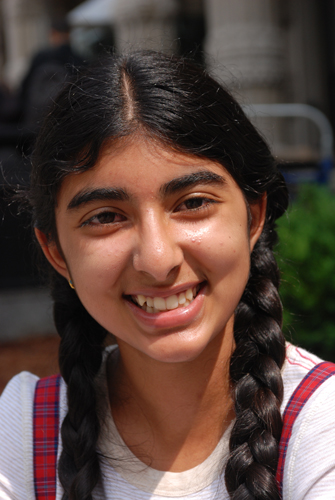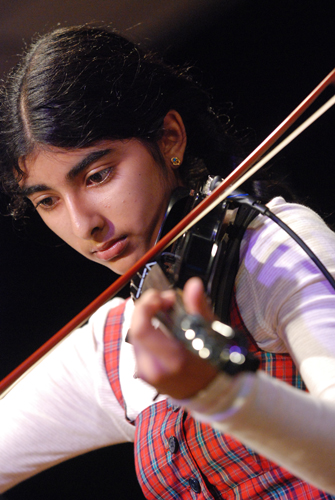Student Profile: Aishu Venkataraman

Aishu Venkataraman<br><b>Hometown</b>: Northridge, California<br><b>Major</b>: Performance<br><b>Instrument</b>: Violin<br><b>Styles</b>: Classical Indian and Jazz
Photo by Phil Farnsworth

Aishu Venkataraman takes a lesson with professor Marc Rossi.
Photo by Phil Farnsworth

Aishu Venkataraman performs with a Brazillian Ensemble.
Photo by Phil Farnsworth
To say that Aishu Venkataraman began her musical career at an early age is a huge understatement. Before she was even 2, she began learning violin; at 7, she was playing full-length concerts featuring South Indian classical music; and by 9, she had released her debut CD Divine Strings.
Listen to "Brovaparama" (traditional)
Now, at 14, when most teenagers her age haven't even begun their college search, the performance major is a quarter of the way through earning a degree at Berklee, where she is honing her jazz skills.
After completing the Twelve-Week Full Credit Summer Program in 2007, Venkataraman—one of the youngest students in Berklee's history—traveled to her family's native India for a series of performances, before heading back home to California to begin her sophomore year of high school.
It's an ambitious plan: earn college and high school degrees simultaneously. But Venkataraman, who says she manages to find time amid her busy schedule to do typical teenage things, is decidedly nonchalant and humble about her fast-track path.
"I think I'm doing a lot more in the summers [than my peers] and I guess I'm working harder, but on the weekends, I'm still nagging my parents. I'll say, 'Dad, I'm going out.' We still have time. We go out to movies a lot."
"I think what's happened in her life is that she's become very focused and become very good at time management," Vinod R. (VR) Venkataraman says of his daughter.
The road to Berklee
Venkataraman—deemed a child prodigy by those who have worked with her—was turned on to Berklee after attending a Performing and Visual Arts College Fair at UCLA. Her father, a professional South Indian drummer and mathematics professor, was no stranger to Berklee, having had performed here. The family arrived at the fair as Peter Gordon, director of Berklee Center in L.A., was getting ready to leave. Venkataraman's father handed him Divine Strings. Gordon called the next day, and the rest is history.
"I was immediately struck at how good she was at such a young age," recalls Gordon. "The thing that was interesting to me is that she wanted to study jazz, and the technique of music [South Indian classical music] that she had already achieved so much in is based in improvisation. I thought potentially that this could be a very good marriage, for Aishu and for the college."
She first came to Berklee as a Five-Week Summer Performance Program student, and while here, auditioned for a scholarship. At the end of the program, she was shocked to learn she won a full-tuition scholarship. She will complete her college degree over the course of four summers. As a result of her proficiency and training, Venkataraman was able to test out of six credits of ear training the first summer, and plans to continue working throughout the school year in hopes to test out of more credits.
For Venkataram, whose father accompanied her here because of her age, the intensity doesn't get to her. "Well, it's fun," she says. "It's what I like to do. And you make a lot of friends here, so it's not tedious."VR Venkataraman traces his daughter's musical beginnings to when she was about 1 year old, when she started recognizing very elaborate Indian scales. She got her first violin-a handmade instrument about half the size of what new players typically use-at 18 months and began learning Suzuki style. Venkataraman's grandmother, a violinist herself, took note of her granddaughter's precocity while visiting from India.
"She said, 'I am not equipped to teach her. The person you need is my teacher T.N. Krishnan,'" Venkataraman's father recalls. When she was around 4, the violin maestro began training her in Carnatic (or South Indian-style classical) music. Simultaneously, Venkataraman was studying Western classical music.
"The classes he gave were very intense," recalls Venkataraman, who now trains with Krishnan about once a year." It felt like a year's worth in a day."
Unlike North Indian music, popularized by the likes of Ravi Shankar, South Indian music is lesser known in the United States. "It's less familiar here because the music was close-knit in how it was taught. It was all the teachings from teacher to student," Venkataraman's father says.
For both North and South Indian music, musicians play their instruments sitting on the floor. Both styles come out of a vocal tradition and feature compositions and improvisation, but while North Indian music has shorter, simpler compositions, South Indian music has more extensive compositions, and can rely more on song repertoire, explains Aishu's private instructor Marc Rossi, who has an extensive background in Indian music. Meanwhile, North Indian music sounds closer to romantic style, while South Indian is closer to a Baroque, more classical style, he says.
Venkataraman, who credits her late grandmother as one of her greatest influences, is still very active in the Indian music scene, traveling there twice a year to perform. Of particular significance is the Madras Music Season in December
Honing her jazz skills
Here at Berklee, she is focusing on jazz, but incorporating her South Indian music. "I wouldn't say I'm playing Indian music standing up, because it still sounds like jazz," says Venkataraman, who fell in love with jazz in sixth grade and has participated in school-based jazz bands ever since. "I'm able to bring some of the [Indian] sounds in and out so it sounds a little different."
She has been working closely Rossi, a professor in the Piano Department and adjunct professor in the Jazz Composition Department. They connected through a mutual friend after he saw Venkataraman perform at a gig in Los Angeles. Venkataraman's father, in turn, has been continuing Rossi's education in Indian music. "It's a circle," her father says.Rossi uses his expertise in Indian music to make connections for Venkataraman while teaching her jazz. "I draw parallels to Indian music," he says. "I'm teaching her stuff about improvisation and overall musical concepts that she can tie in to her own music."
Working with Venkataraman has been a unique experience for Rossi. "She's a full-bore virtuoso," he says. "I've only seen a handful of people like this in my life. She's amazingly developed at a very early age. Some people will spend their whole life and not get to this point. It's pretty rare. There is no question that she's a prodigy."
"The thing about her that's most extraordinary is her determination and work ethic," Rossi continues. "And she still has fun. She still has a life."
VR Venkataraman is pleased with his daughter's progress at Berklee. "Basically, her education is moving at an exponential pace," he says. "The same thing would maybe take another teacher a year to bring it home, whereas Marc, because of his adequate knowledge of Indian music, and his ability to play it on the piano, he is able to play the mode or scale on the piano and say, 'This is how this relates to this ragam of yours.' "
Meanwhile, Rossi's instruction has gone beyond teaching Venkataraman jazz. She is able to model his teaching methods—drawing parallels between Western and Indian music—when she offers clinics of her own.
"India meets America," Venkataraman says. "My goal is to bring South Indian music to this country a little more so I can just really show people what it is."
And in what's left of her spare time, she is collaborating with Baylor College of Medicine and serving as a spokesperson for its International Pediatric AIDS initiative, holding benefit concerts for the cause.
While Venkataraman plans to pursue a career in music, she also has her sights set on medical school to fulfill her other dream of becoming a physician. This is no surprise for someone who has a knack for pursuing many goals at once.
Aishu's top Five Most Influential Albums
- Ornithology - Charlie Parker
- The Definitive Collection - Stevie Wonder
- Heavy Weather - Weather Report
- Wicked, musical soundtrack
- Breathless - Shankar Mahadevan
